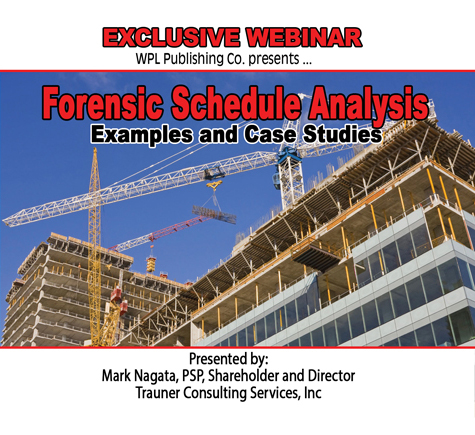Forensic Schedule Analysis --
Practical Examples and Case Studies
Presented by:
Mark Nagata, PSP
Trauner Consulting Services, Inc.
This informative 90-minute program:
- Sets the stage by briefly introducing basic Critical Path Method (CPM) scheduling terminology such as “float,” the "longest path," and the "critical path."
- Introduces the AACE document, “Recommended Practice for Forensic Schedule Analysis.” Though not quite an industry standard, the document is a widely used treatise that identifies and describes the many approaches to the analysis of delays. The webinar shows you what’s important to know in this 100-plus-page document and how to use the information it contains to establish your entitlement to a time extension and reimbursement of your delay costs.
- Helps you work through several examples and case studies demonstrating how to apply a few basic principles and approaches to the identification and quantification of critical project delays.
Who Will Benefit?
These webinars are a must if you’re a contractor, public or private owner, subcontractor, construction manager, owner’s representative, architect, or other design professional providing project-oversight services. The program especially will benefit attorneys who represent these parties in disputes.
Meet Your Presenter:
 Mark Nagata’s expertise lies in the areas of construction claims preparation and evaluation, development, and review of CPM schedules, delay analysis, dispute resolution, specification writing, and training. He was a contributing author for and continues to provide additional revisions to AACE’s Recommended Practice No. 29R-03 for Forensic Schedule Analysis. This is the first industry publication to comprehensively classify the many schedule analysis techniques. His contribution included describing and defining the Contemporaneous Period Analysis, also called the "Contemporaneous Schedule Analysis."
Mark Nagata’s expertise lies in the areas of construction claims preparation and evaluation, development, and review of CPM schedules, delay analysis, dispute resolution, specification writing, and training. He was a contributing author for and continues to provide additional revisions to AACE’s Recommended Practice No. 29R-03 for Forensic Schedule Analysis. This is the first industry publication to comprehensively classify the many schedule analysis techniques. His contribution included describing and defining the Contemporaneous Period Analysis, also called the "Contemporaneous Schedule Analysis."
This webinar will teach you how to perform the analysis of project delays that are needed to determine the cause and duration of the critical delays you experienced. The program focuses on delays that already have occurred on your project and are unlikely to be recovered through acceleration. The presentation draws upon AACE International's Recommended Practice for Forensic Schedule Analysis as its foundation. But the webinar is loaded with practical examples and real case studies to show simple and successful approaches to the quantification of delays.

